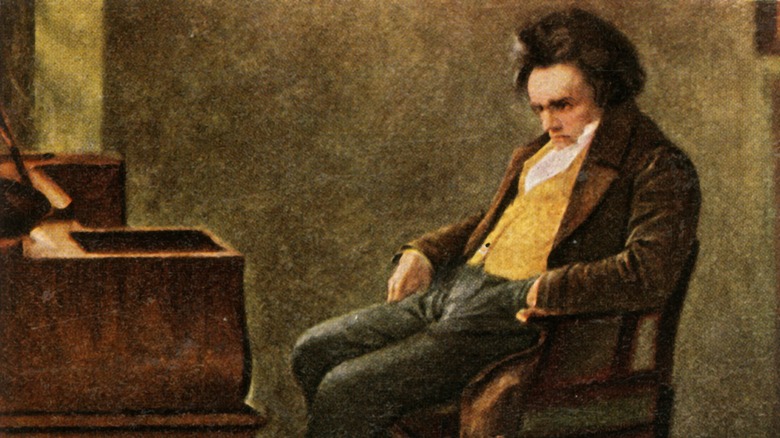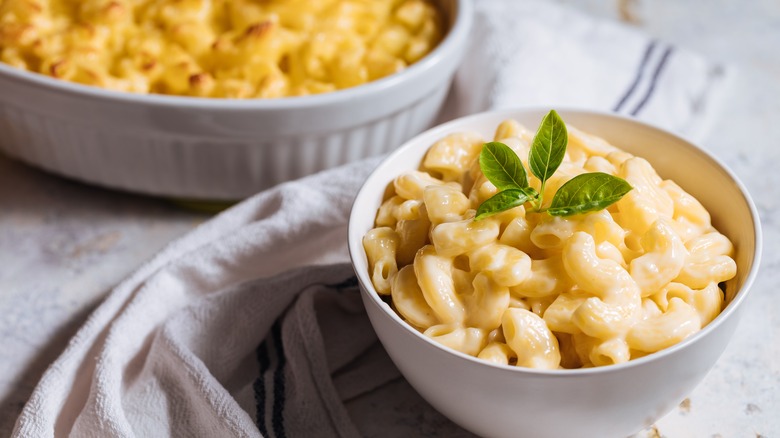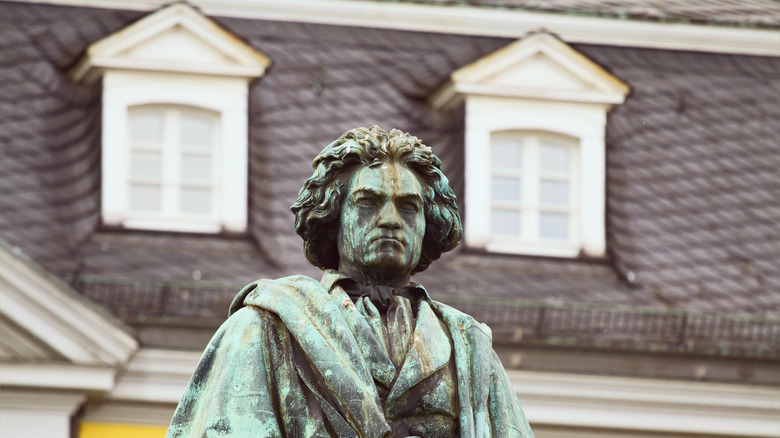Beethoven Paid A Heavy Price For His Love Of Mac And Cheese
Ludwig van Beethoven's music has appeared in dozens of movies over the past several decades, and recent studies have also shown that his music, and that of other classical composers, actually has positive effects on the human brain, from boosting memory to lowering blood pressure. So there's no doubt that Beethoven's influence is still being felt in contemporary life, even though he's been dead for nearly 200 years. But who knew his most significant contribution to popular culture was as one of the first true connoisseurs of macaroni and cheese?
Well, we did. But it's important to note that Beethoven wasn't eating Kraft or Stouffer's brand macaroni and cheese. He was eating a much fancier version, as befits a late 18th-century and early 19th-century classical music icon. What the German composer really liked was "Macaroni mit Parmesan-Käse," a specialty dish that paired macaroni with imported Italian Parmigiano-Reggiano cheese. This bombshell was dropped by Anton Schindler, a violinist who was a musical contemporary of Beethoven and the man who penned the first book about the composer's life.
Beethoven paid dearly for his favorite nosh, however, as both the macaroni and the imported cheese were quite pricey at the time. Macaroni, for context, was triple the cost of rice. Beethoven was also overweight later in life, although this has been attributed to a cause (a glandular disorder) unrelated to his frequent helpings of mac and cheese, which he reportedly liked extra-cheesy.
Beethoven's other favorite foods
Had Beethoven just finished a bowl of mac and cheese when he wrote "Ode to Joy?" It's not known. But we do know Beethoven had some strong opinions about food. According to Popular Beethoven, the composer reputedly remarked, "Only the pure in heart can make a good soup!" Strangely, Beethoven's preferred choice to accompany his beloved soups was 10 raw eggs, which he would crack open by hand at the table. He was an eccentric, in other words, as many great artists are.
This eccentricity had a dark side. He often complained that his cooks were attempting to poison him. When they weren't stealing from him, that is. His passion for some foods — like macaroni and cheese, or his favorite fish dish, pollock with potatoes — was contrasted with a loathing for certain dining conventions of the time. For example, he railed against restaurants that served too many dishes and often skipped meals entirely. In fact, he frequently omitted supper so that he could return to the piano to continue composing.
Beethoven also wasn't much of a cook. On one of the rare occasions he decided to cook for guests, virtually every dish was a disaster. But he could do justice to a bottle of wine, and he was an avid coffee drinker. The native German relocated to Vienna, Austria as an adult, where he enjoyed having coffee with Franz Joseph Haydn, another famed composer of the era.
How Beethoven likely fell in love with mac and cheese
By the time Beethoven began composing some of his most famous symphonies — the composer's musical career began in 1782 and ended with his death in 1827 — several German culinary favorites had already been invented.
Spätzle, for instance, was being made in Germany as early as 1725, and the popular egg noodle-based dish quickly spawned several variations. One of these, in fact, is known as Käsespätzle, a mix of noodles and cheese sauce that is quite closely related to macaroni and cheese. So Beethoven may have come by his love for mac and cheese style cuisine very early in life, although it should be noted that Käsespätzl also includes onions.
Given that this mac and cheese relative originated in Schwaben — a region just south of Bonn, where Beethoven was born — and was popular in both Germany and Austria (the countries where the composer spent his life), it seems quite likely that he tried Käsespätzle first before settling on Macaroni mit Parmesan-Käse as his favorite pairing of cheese and pasta noodles. However, there is no solid historical evidence to back up this claim. But we do know that he loved mac and cheese and he loved music, although not necessarily in that order.



